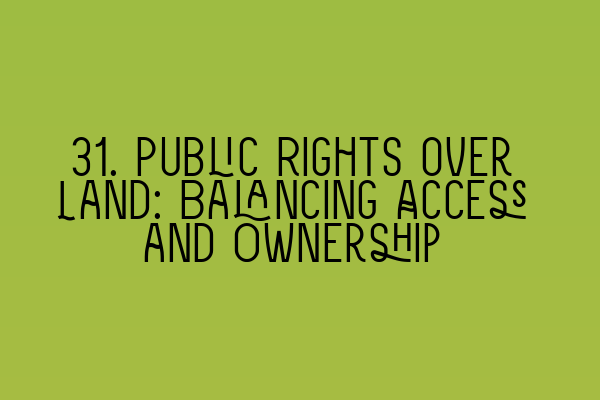Public Rights over Land: Balancing Access and Ownership
Land ownership has always been a cornerstone of society, providing individuals with security and autonomy. However, it is important to strike a balance between the rights of landowners and the public’s access to certain types of land. This delicate balance ensures that both private property rights and public interests are respected.
Public rights over land refer to the legal rights granted to individuals, groups, or communities to access and use certain areas of land. These rights are often based on historical, cultural, or customary practices, and are designed to promote public welfare and the common good.
Understanding Public Rights over Land
In many jurisdictions, public rights over land are recognized and protected by law. These rights can include:
- Public highways and footpaths: Public highways and footpaths are essential for public mobility and accessibility. They provide vital links between communities, promote physical activity, and enable individuals to enjoy the natural environment. Landowners are obliged to maintain these routes and allow public passage.
- Public parks and recreational areas: Public parks and recreational areas are important spaces for community gatherings, leisure activities, and relaxation. These areas are often owned by local authorities but are open for public use and enjoyment.
- Public beaches and waterways: Public beaches and waterways are valuable resources for leisure activities such as swimming, fishing, and boating. Landowners near these areas are often required to allow public access up to the defined boundaries of the beach or waterway.
- Rights of way: Rights of way are legal paths or routes that allow the public to cross private land. These rights are typically established by long-standing usage or specific legal arrangements, such as easements or licenses. They provide access to areas that may not be accessible otherwise.
The Importance of Balancing Access and Ownership
The concept of balancing access and ownership is crucial for society to thrive. It ensures that landowners can exercise their rights and use their property effectively, while also allowing the public to benefit from the natural and man-made resources that certain types of land offer.
This balance is particularly important for access to nature and outdoor recreational areas. Studies have shown that spending time in nature has numerous benefits for physical and mental health. Access to green spaces, parks, and natural landscapes promotes well-being, reduces stress, and fosters a sense of community.
Effective management and regulation of public rights over land also play a role in preventing congestion, overexploitation, and degradation of certain areas. By providing guidelines and limitations, authorities can ensure that public access is sustainable and does not unduly burden landowners.
The Role of Solicitors in Public Rights over Land
Solicitors specializing in property law and land law play a crucial role in negotiating and protecting public rights over land. They assist both landowners and public authorities in navigating the complex legal framework surrounding public access and ownership.
For landowners, solicitors can provide advice and representation in matters relating to public rights over their land. They can help determine the extent of public access rights, negotiate agreements with public authorities, and protect their property rights while ensuring compliance with legal obligations.
Public authorities, on the other hand, rely on solicitors to draft and enforce legislation that balances public access and land ownership. Solicitors assist in drafting regulations that define and protect public rights over land, ensuring that access is fair, reasonable, and aligned with public interests.
Conclusion
Public rights over land are a crucial aspect of our legal system, balancing the rights of landowners with the public’s need for access to certain types of land. Striking this balance is essential in promoting public welfare, community well-being, and sustainable land use.
If you have any further questions about public rights over land or require legal advice, contact SQE Property Law & Land Law, where our team of experienced solicitors can guide you through the complexities of this area of law.
Related Articles:
